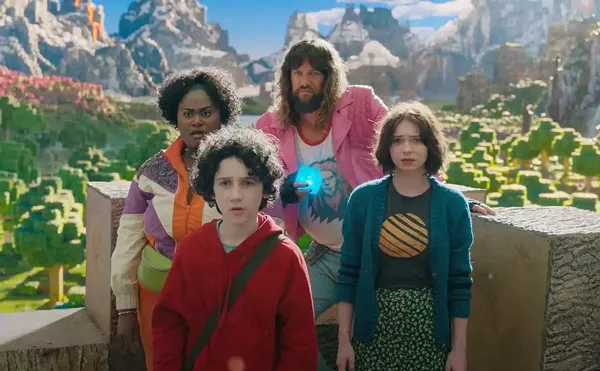What would Jennifer Gratz make of The Pursuit of Happyness? The University of Michigan reject and "victim" of affirmative action brought her wrath down on the entire state when the curiously well-funded "Civil Rights" initiative passed in November. Now we have a movie in which Will Smith plays Chris Gardner, a smart, hardworking African-American man struggling to keep his head above the treacherous economic waters of Reagan-era San Francisco. In its plot and dialogue, the movie never plays the race card. But the inequality is there in every shot: When the faces of the city's Mercedes-driving, hotshot businessmen are almost all white, and the throngs of people waiting in line at the homeless shelter are almost all black, it doesn't take a genius to know a wrong needs to be righted.
Happyness doesn't press the issue — this is, after all, a feel-good Will Smith movie — but there's a subtle, subversive touch brought to the material by Smith, director Gabriele Muccino and writer Steven Conrad that's lacking in most overcoming-the-odds tales of empowerment. The movie will strike a chord with anyone who experienced firsthand the rampant layoffs, downsizing and general economic malaise of the '80s. When it opens, Gardner is already leading a hand-to-mouth existence as a medical-equipment salesman (a job recapped in a nifty, fleet-footed flashback). His wife Linda (Thandie Newton) works in a hotel. They can barely afford to keep their 5-year-old (Smith's real-life son Jaden) in his sketchy day care — where the kids misspell the word "happiness" — let alone pay their rent.
Chris thinks he's found the ticket to a better life when he applies for an unpaid internship at the investment firm Dean Witter; Linda, sick of Chris' schemes, walks out on her husband and son. "Salesman to intern is backwards," she says.
The rest of the movie chronicles Chris' long, hard slog to simply get by on little to no income as he kisses ass and proves his worth at Dean Witter. It's not so much a rags-to-riches story as it is a rags-to-homelessness-to-eventual-employment tale. The film is far from complex: the voiceover narration is as simplistic as a junior-high essay, and Linda's shrill heartlessness is hard to fathom. But Muccino and Smith are able to wring tension, laughs and pathos out of Chris' struggle to be all things to all people: a providing father, a dutiful employee and a shit-eating salesman. Muccino understands how a city can swallow a person whole, and he shoots San Francisco with a mix of awe, reverence and terror as Chris moves from the scummiest shelters to the most antiseptic high-rises.
And watching the normally irrepressible Smith bottle himself up, straighten his thrift store tie and attempt to put on an eager face for his self-satisfied, would-be employers is something to see. This is one of those gritty, earthy makeovers for a multimillion-dollar superstar that actually works, something akin to what Julia Roberts did a few years ago with Erin Brockovich. The role of Chris Gardner allows Smith to exhibit all of the qualities that made him popular in the first place — his hustle, his charisma, his humor — while adding new shades of desperation, humility and repressed rage. A more cynical (read: conservative) crowd could read Pursuit of Happyness as a "pull yourself up by your bootstraps" story of success through good, old-fashioned hard work. But those who pay close attention to Smith's face will see that it's the story of a lifelong overachiever who's been waiting for the rest of the world to give him just one tiny break.
Michael Hastings writes about film for Metro Times. Send comments to letters@metrotimes.com.






